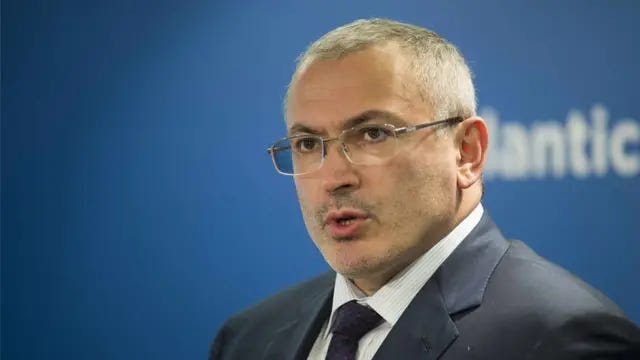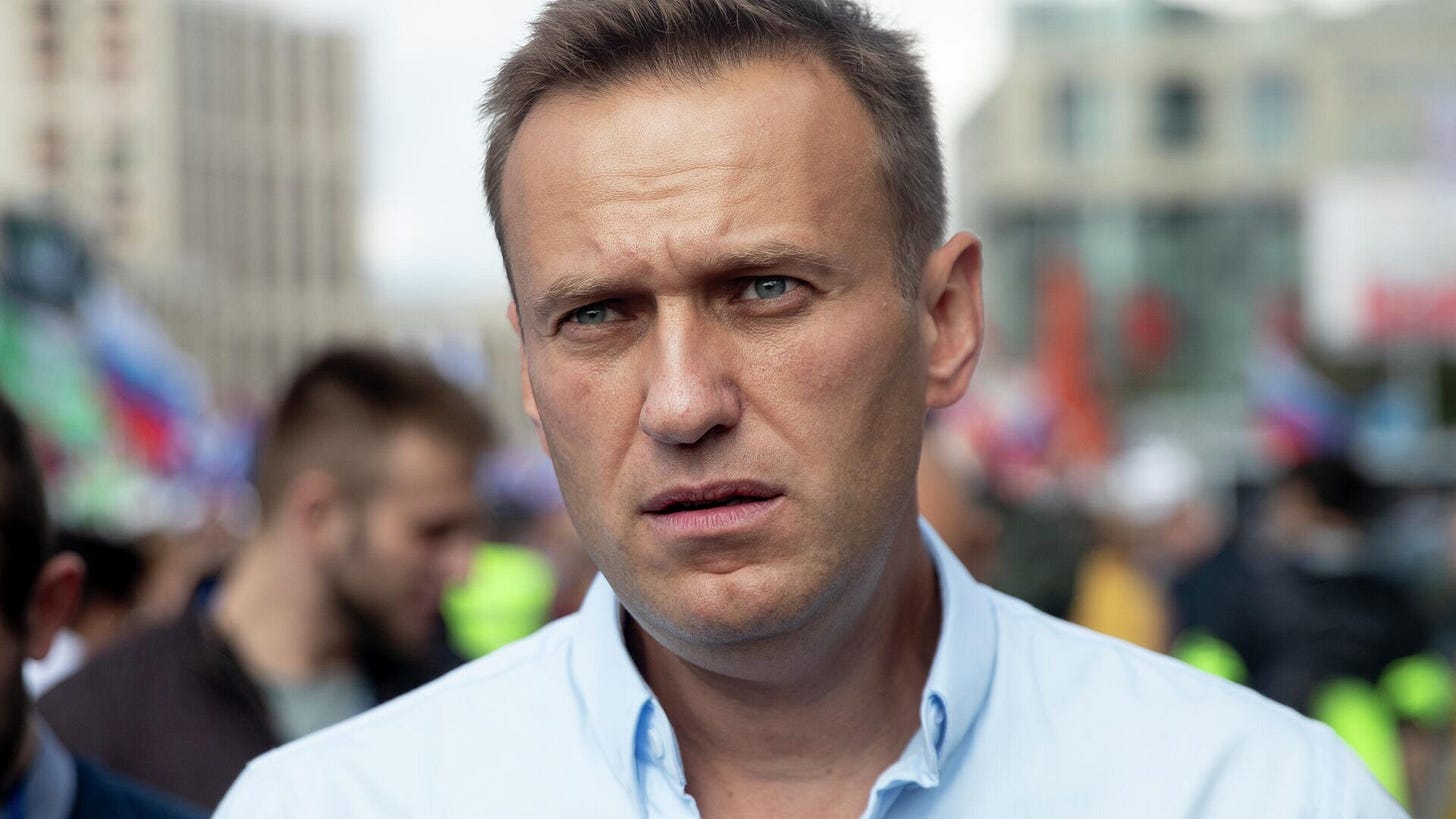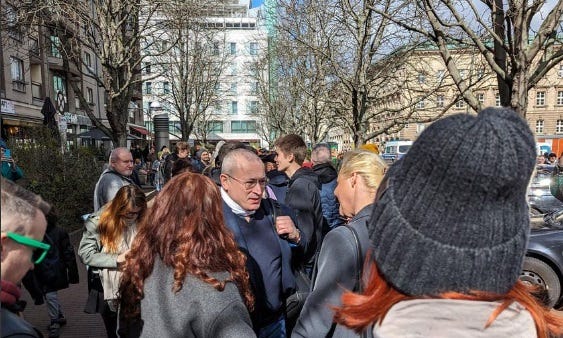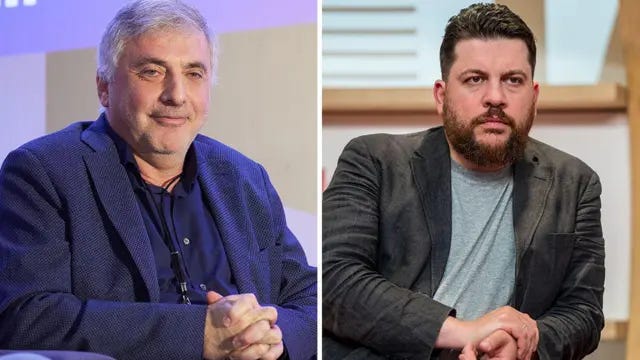I usually talk about how Russia is structured and what’s happening there, but today, I need to make an exception. I’m not going to discuss the real Russia—I’m going to talk about an imaginary one. Maybe you never wanted to know how the Russian diaspora functions abroad, but last week, something so significant, so monumental happened that I have no choice but to tell you about it.
Outer Russia is now torn apart, engulfed in an internal war, and it will never be the same again.
Outer Russia
After Putin began his invasion of Ukraine in February 2022, it was as if two Russias emerged. One could be called Inner Russia—the country within the current borders of the Russian Federation. Then there’s Outer Russia, made up of all the Russian-speaking people living outside of Russia. These are mostly immigrants who left in recent decades.
By various estimates, between 20 and 30 million people who identify as Russians live outside of Russia. If we assume that 1.5 million left in 2022 alone, then several million more obviously emigrated from Russia over the previous decade. These people are scattered across the globe, living everywhere from Australia and Thailand to Bali and Sri Lanka, in former Soviet states like Kazakhstan, Georgia, Armenia, or Moldova. You’ll find them in the Baltic countries, Serbia, Montenegro, and beyond—in the Netherlands, Germany, England, and France, in the United States and Canada, in Argentina, Mexico, and many other places.
One could say that in this Outer Russia, there are two of the most influential political forces. You might call them political parties, but they don’t identify as such. They’re more like clans or camps.
These clans have almost no ideological disagreements, yet they are constantly at odds. Why? That’s a very complicated question, and there may not even be an answer. It has always been this way. They have always hated each other, even though their ideologies are nearly identical. Both clans oppose Putin, stand against the war in Ukraine, support a democratic Russia, and advocate for Western liberal values.
Who are these clans? Roughly speaking, they can be called the Khodorkovsky Clan and the Navalny Clan.
Both have powerful, independent media outlets with massive followings and supporters. Each operates a media empire in its own right, active across all digital platforms. They have popular YouTube channels, produce their own films, conduct independent investigations, run popular Telegram channels and websites, and feature many recognizable media personalities. And, of course, they have active supporters on Twitter who are constantly engaged in never-ending feuds with each other.
For example, the Navalny Live channel has 6.45 million subscribers (this channel has always published the major investigations of the Anti-Corruption Foundation (FBK), and since Alexei's death, it features video addresses from his widow, Yulia). The FBK's YouTube channel, called Popular Politics, has 2.69 million subscribers (this one is more of a news channel). Mikhail Khodorkovsky is associated with several channels, with two main ones having nearly identical names. Khodorkovsky Live has 2.57 million subscribers (it resembles a TV channel), while Mikhail Khodorkovsky's personal channel has 1.28 million subscribers (it's more like a personal blog).
In Outer Russia, there are, of course, other influential media companies, such as the TV Rain (Dozhd) or Meduza. However, neither TV Rain nor Meduza can be seen as political parties. They don’t have clear political ambitions—at least not for now—and none of their staff position themselves as political leaders. But when it comes to the employees of Alexei Navalny’s Anti-Corruption Foundation or Mikhail Khodorkovsky’s group, it’s clear from the start: these are political organizations, and they intend to fight for power in a future Russia.
Khodorkovsky Clan
Until 2003, Khodorkovsky was the richest man in Russia and the owner of the oil company Yukos, then the most powerful oil producer in the country. By 2003, he had clearly grown bored of just being a businessman and had developed political ambitions. He began meeting frequently with various public figures and members of the State Duma, publicly advocating that Russia should be a parliamentary republic, not a presidential one.
Moreover, ahead of the 2003 parliamentary elections in Russia, Mikhail Khodorkovsky and his team began funding several opposition political parties. This was hardly a secret. In fact, his group openly acknowledged their plans to secure a powerful faction in the Russian parliament and, through it, possibly change the constitution. Their goal was to reduce the presidency to a ceremonial role and transfer real power to the government and the prime minister. And it was Mikhail Khodorkovsky who intended to become that prime minister.
At that time, the gray eminence behind Mikhail Khodorkovsky—the mastermind or co-author of his political campaign and the architect of his devised political strategy—was his close partner and Yukos shareholder, Leonid Nevzlin. Nevzlin was also a senator in the Russian Federation and headed one of the largest humanitarian universities in Russia, which Yukos had acquired.
However, this plan was never realized because Vladimir Putin found out about it. Putin and the FSB quickly and decisively took every measure to ensure that a parliamentary republic would never emerge in Russia, understanding that it would pose a deadly threat to their power. As punishment for this plan, Mikhail Khodorkovsky was arrested, Yukos was dismantled and bankrupted, and all of its assets were transferred to the state oil company Rosneft, headed by Putin’s close associate Igor Sechin.
Leonid Nevzlin left Russia immediately after the Yukos case began and relocated to Israel, where he started suing the Russian Federation in various international courts—and quite successfully. Over the past 20 years, he has won several billion dollars in judgments against Russia.
Leonid Nevzlin
Mikhail Khodorkovsky was sentenced to a long prison term and spent 10 years in a Russian prison. In 2013, shortly before the Sochi Olympics, Putin released him. The mediator and organizer of the operation to get Khodorkovsky out of Russia was former German Foreign Minister Hans-Dietrich Genscher, with the assistance of then-German Chancellor Angela Merkel. Khodorkovsky was not exchanged for anyone. At least officially, the price Germany had to pay for the release of Russia’s most prominent political prisoner was never disclosed.
After leaving Russia and prison, Khodorkovsky moved to London. For the first year, he stayed away from politics and public life, but then he announced his return to politics with the intention of fighting against Putin. Since then, he has established numerous independent media outlets.
For a long time, the media outlets created by Khodorkovsky were repeatedly unsuccessful. They did not gain widespread popularity and usually lagged behind in both audience size and content quality compared to media still operating in Russia. However, after the full-scale invasion of Ukraine began and all independent journalists left Russia, the situation changed dramatically. Mikhail Khodorkovsky became one of the most significant players in the Russian media landscape. (I mean, The media market exists only in Outer Russia, as there is no media market left in Inner Russia.).
Many journalists who left Russia began working for various media projects within Mikhail Khodorkovsky’s empire. However, the true number of subdivisions in this holding is unknown. Many journalists receive grants from Khodorkovsky, while others work without publicly revealing their affiliation with him.
Khodorkovsky’s former partner, Nevzlin, still lives in Israel and is a co-owner of the newspaper Haaretz. It is believed that he and Khodorkovsky no longer have any joint business ventures, but they do not hide the fact that they remain close friends. In one of his recent interviews, Khodorkovsky said that Nevzlin is “more than family” to him.
In early 2022, Khodorkovsky and Nevzlin joined an organization called the Russian Anti-War Committee. Initially, there was an idea that it could become something like a government-in-exile, bringing together the most prominent Russian politicians, activists, and opinion leaders who had fled the country and opposed Putin and the war. However, this never materialized, mainly because Navalny’s supporters chose to ignore the Anti-War Committee entirely.
Navalny clan
Alexei Navalny emerged as a prominent political figure in Russia in 2010. He gained fame as a minority shareholder by filing lawsuits against major Russian state-owned corporations and launching his investigative blog. By the end of 2010, Vedomosti, one of Russia’s leading business newspapers, named him Person of the Year.
By 2011, he had become the most prominent leader of protest movements in Russia and was frequently arrested for participating in demonstrations. He has become the leader of the protests on Bolotnaya Square in Moscow and most of Russia’s big cities in the winter of 2011–2012 – as people were rallying against Putin’s third presidential term.
In 2012, Navalny was elected chairman of the Coordinating Council of the Russian Opposition, though it never became an effective organization. Still, it was clear that Navalny was the most popular opposition politician in the country.
In 2013, Navalny nearly became a political prisoner when criminal charges were brought against him in Kremlin’s attempt to end his political career. He was sentenced to 5 years in prison, a decision that sparked mass unrest in Moscow, with crowds nearly storming the Russian parliament building. The next day, Russian authorities changed their mind: the sentence was overturned, Navalny was released, and he was even allowed to run for mayor of Moscow.
In that election, Navalny received about 27% of the vote, finishing in second place, but failing to force a runoff. According to official results, the incumbent mayor, Sergei Sobyanin, won outright in the first round. However, independent observers believed that Sobyanin’s victory was far from certain at the time, and that if the vote count had been more transparent, a second round might have been necessary—with Navalny making it through.
Thus, while Khodorkovsky spent 10 years in prison, Navalny’s political star was rising, and by the time Khodorkovsky was released at the end of 2013, Navalny had firmly secured his position as the most popular opposition politician in Russia.
However, his star nearly faded. In 2014, after the annexation of Crimea, all opposition leaders were hit with a severe shock, and their popularity wavered. Later that year, Navalny became the target of another politically motivated criminal case, which ended quite harshly for him: his brother, Oleg, was sent to prison, while Navalny himself was placed under house arrest.
Nevertheless, Navalny managed to relaunch his political career. He created his YouTube channel, and soon became the most popular political video blogger in Russia. His investigations garnered an incredible number of views, and by 2016, Navalny was once again a hero to millions, attracting an entirely new audience. This wasn’t the crowd of protestors from Bolotnaya Square in the winter of 2011–2012; it was the new, younger generation who discovered Navalny through YouTube.
All these years, it seemed there could be no competition between Navalny and Khodorkovsky. Navalny remained in Russia and was engaged in real politics, while Khodorkovsky lived in London, trying to build tools of influence. Despite being a significant and influential figure abroad, Khodorkovsky couldn’t claim much popularity within Russia, as most Russians had barely heard of him.
Navalny was well aware of this issue. He often stated that to be a Russian politician, you have to live in Russia. Any activist fighting Putin’s regime from abroad quickly loses their footing, their ability to connect with an audience, their popularity, and even the moral right to oppose the regime. In 2020, after surviving an assassination attempt, receiving treatment at Berlin’s Charité clinic, and recovering, Navalny decided to return to Russia.
At the time, his decision seemed strange to everyone. Many, especially foreign journalists, couldn’t understand why he was heading straight into potential danger. Why return to Russia, knowing he would be arrested? But Navalny kept repeating the same message: he wanted to remain a Russian politician, and that could only be done from inside the country. Though he never publicly stated that he didn’t want to become another Khodorkovsky, the sentiment was clear enough.
Clash of clans
Russia’s invasion of Ukraine completely changed the situation. A huge number of Navalny’s supporters left Russia, leading to the emergence of the Outer Russia I mentioned earlier. Almost all the staff of the Anti-Corruption Foundation, the organization founded by Navalny, had already been forced to leave even before this, as the organization had been declared a terrorist group in Russia. All of Navalny’s staff had to emigrate to avoid criminal prosecution and imprisonment.
So two powerful clans arose in Outer Russia: the FBK Clan and the Mikhail Khodorkovsky Clan.
From the very beginning of Russia's full-scale invasion of Ukraine, it was clear to anyone following the politics of Outer Russia that there was a constant struggle between FBK and Khodorkovsky’s group. Mikhail Khodorkovsky and his team tried to unite the entire opposition, while Navalny’s people resisted these efforts.
From the outside, it looked like this (Here’s a rough idea of how most journalists saw the positions of both sides): Khodorkovsky wanted to create a united front and, naturally, become its formal or informal leader, as he was both the most well-known and the wealthiest opposition figure in Outer Russia.
Navalny’s allies, naturally, didn’t want to unite with anyone, likely believing it wasn’t in their best interest. Why join forces when they were already the most popular political group in Outer Russia on their own? Even while incarcerated, Alexei Navalny remained the most prominent opposition figure. He continued to write letters from prison and regularly updated his Twitter and Instagram, maintaining a constant presence in the public sphere.
This clash of positions frequently erupted into public spats. Khodorkovsky’s supporters accused FBK of obstructing the unification efforts, while FBK’s supporters accused Khodorkovsky’s camp of smearing them and waging a campaign against them under the guise of promoting a unification that no one really needed. They argued that it was entirely possible to fight the Russian regime without formally uniting.
These tensions were usually left unspoken, but everyone understood the situation. People from Navalny’s camp avoided events where Mikhail Khodorkovsky or his key allies were present, and vice versa. It was obvious that the two clans despised each other, and it was widely known that both sides took various actions against one another.
It wasn’t customary to write about this—why draw attention to internal conflicts within the Russian diaspora? For political exiles, it felt shameful, and they preferred not to air their dirty laundry. Everyone already knew what was going on. Nevertheless, especially on Twitter, new scandals flared up with surprising regularity.
Maria Pevchikh
For example, at the end of 2023, Khodorkovsky’s supporters eagerly embraced the idea that Navalny was not the one writing the texts attributed to him on Twitter and Instagram. Instead, they claimed that his messages were being written by his allies, such as Maria Pevchikh, Leonid Volkov, or Georgy Alburov. There were even investigations and stylistic analyses conducted to uncover the true authorship of these messages, although Navalny’s team consistently denied these rumors, insisting that Navalny was indeed writing everything himself.
In February of this year, Navalny was killed in prison, seemingly putting an end to this obvious rivalry. The day of the Russian presidential election became a symbol of possible reconciliation between the two clans. On that day, Navalny’s widow, Yulia, called on all Russians to come to the polling stations at noon to demonstrate their willingness to stand up against Vladimir Putin.
The unexpected appearance of Mikhail Khodorkovsky alongside Yulia Navalnaya in Berlin that day became the symbol of reconciliation between the two clans. Khodorkovsky had somehow flown to Berlin, where Yulia Navalnaya was that day, and approached her to offer his condolences and support. The photograph of the two leaders of Outer Russia together became the day’s most significant symbol.
However, Yulia Navalnaya and Mikhail Khodorkovsky never spoke ill of each other personally. This didn’t mean that the sense of rivalry between the two clans had disappeared. On the contrary, shortly after Navalny’s death, FBK’s head of investigations, Maria Pevchikh, released a new documentary series titled “Traitors,” exposing the oligarchs of the 90s who, according to her, betrayed the interests of Russian democracy for personal gain and helped bring Putin to power.
Mikhail Khodorkovsky and Yuia Navalnaya
Mikhail Khodorkovsky, himself an oligarch of the 90s and a beneficiary of the infamous loans-for-shares auctions—the very means by which he acquired the oil company Yukos—was an obvious target of the film. Initially, he reacted very negatively to the investigation. However, after all three episodes were released, it became clear that the film was not specifically against Khodorkovsky, and he even apologized for his initial harsh reaction.
However, many of Khodorkovsky’s supporters viewed the film as a political attack—a deliberate attempt to cancel Khodorkovsky’s future, to discredit him as a political figure capable of influencing the shaping of Russia’s future. They felt that his reputation, as outlined in Maria Pevchikh’s investigation, was somewhat compromised by his past in the 1990s.
The ongoing sniping between FBK staff and Khodorkovsky’s team continued over the past few months, until last week when an atomic bombshell dropped. After what happened, the world of Outer Russia split in two. Reconciliation is no longer possible, and unity will never be on the table again.
Nuclear war
Last week, FBK released an investigation accusing Leonid Nevzlin, a longtime ally and key partner of Mikhail Khodorkovsky, of allegedly ordering attacks on several FBK supporters and leaders. There were at least three such attacks, the most notorious being the assault on Leonid Volkov, the former head of Alexei Navalny’s campaign headquarters and former director of FBK. In April of this year, Volkov was attacked and beaten with hammers in Vilnius.
Volkov was seriously injured, though his life was not in danger. Prior to this, there had been less severe attacks on other current FBK members. These attacks were widely believed to have been orchestrated by Russian intelligence services, namely the FSB.
However, according to the latest investigation, the true mastermind behind these attacks was Leonid Nevzlin. The investigation itself raises some questions. It was made possible when an anonymous individual contacted the FBK team, claiming to be a former employee of Nevzlin. This person provided details on how the attacks were organized, along with screenshots of conversations and recordings of phone calls with Nevzlin.
Leonid Nevzlin, Leonid Volkov
From a traditional journalism standpoint, the investigation is far from perfect. There is no second source, and no technical verification to confirm that the voice on the recordings is indeed Nevzlin’s. In short, the investigation is flawed. Nevertheless, certain details have convinced many viewers that the material could be authentic.
I won’t delve into how credible or professional the investigation is, or whether Nevzlin is truly guilty of what FBK accuses him of. In part, that may no longer be the main issue. What matters now are the consequences: the cold war within the Russian diaspora has essentially turned hot—and perhaps even nuclear. After these events, the animosity has spilled into the open, and a large portion of FBK’s loyal audience now seems convinced of the investigation’s authenticity.
It’s still unclear how this explosive event will reshape the political landscape of Outer Russia and to what extent it will disillusion Russians now scattered across the globe. Until now, there was a sense that those Russians who fled the war were somewhat consolidated, united by certain institutions—primarily opposition media. For them, the media outlets owned by Khodorkovsky and FBK served as crucial ties, key civil institutions relied upon everywhere, from Argentina to the Australia.
The conflict itself is far from over—in fact, it’s only just beginning. Neither Leonid Nevzlin nor Mikhail Khodorkovsky has fully responded to the accusations. Nevzlin denies any involvement in the alleged crimes, while Khodorkovsky seems to have paused, stating that there are essentially two possibilities: either Nevzlin has lost his mind, or he is innocent, and the entire investigation is a mistake.
This aligns with Leonid Nevzlin’s version of events: that it’s all a grand FSB provocation. He claims that the source who provided FBK with this information is actually an agent working for the Kremlin, deliberately fabricating the data to mislead FBK and create this horrifying narrative. According to Nevzlin, the goal is to destroy the entire Russian opposition movement.
What happens next remains uncertain. The idea of contract killings and assassination attempts is too horrifying to believe, and it’s something people don’t want to be part of—they don’t even want to know about it. One possible consequence is that Russians who once saw an alternative to Putin and hoped that exiled Russian politicians would eventually lead them to a better future may lose faith entirely.
Obviously, this is exactly what Vladimir Putin dreams of.










